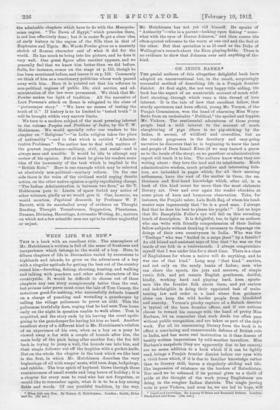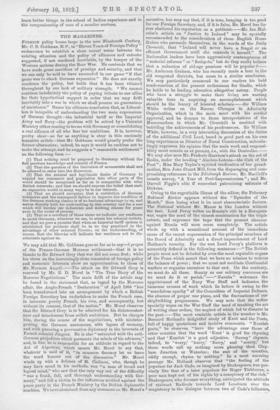ON INDUS BANKS.*
THE genial authors of this altogether delightful book have adopted an unconventional but, in the result, surprisingly successful method of describing life in a Punjab frontier district. At first sight, the not very happy title aiding, the book has the aspect of an amateurish account of much wild- fowl shooting, through which runs a thin thread of lover interest. It is the tale of how that excellent fellow, that sturdy sportsman and keen official, young Mr. Vernon, of the- Punjab Commission, won the hand of charming Miss Wayn- fleete from an undesirable "Political," the spoiled and foppiali. Mr. Vickers. The sentimental adventures of these young people lend a mild interest to the account of much slaughtering of pigs (there is no pig-sticking by the Indus, it seems), of wildfowl and crocodiles, but ass the reader progresses in the desultory and easy-going narrative he discovers that lie is beginning to know the landi and people of Dera Ismail Khan (if we may hazard a guess as to the locale of the story). as no gazetteer or administratioi. report will teach it to him. The authors know what they are- writing about : they lore the land and its inhabitants. Much administrative wisdom, much primitive and interesting folk- lore, are imbedded in pages which, for all their eeeming. artlessness, have the root of the matter in them, the en- thusiasm and first-band knowledge which, after all, in re book of this kind count for more than the most elaborate literary art. Over and over again the reader chuckles at some piece of keen and humorous observation. Take, for instance, the Punjabi usher, Lela Bodh Raj, of whom his head- master says ingenuously that "lie is a good man. I always find that be does his best to please his pupils !" Let us hope. that Sir Bampfylde Fuller's eye will fall on this revealing touch of description. It is delightful, too, to light on authors who can write with friendly comprehension of their Indian fellow-subjects without thinking it necessary to disparage tle. doings of their own countrymen in India. Who was the. " Trollope " who was "knifed in a snipe jheel" by a fanatic.? An old friend and assistant says of him that "he was on the inside of our folk in a twelvemonth. I always congratulate myself that I was under him for a short time. There is a class of Englishman for whom a native will do anything, and he was one of that kind." Long may "that kind" survive, and not only on the sandy banks of Indus; men who can share the sports, the joys and sorrows, of simple rustic folk, and yet remain English gentlemen, dutiful, kindly, working hard and playing hard, keen sports- men like the frontier folk about them, and yet zealous and indefatigible in doing their appointed teak of main'- taming law and order in a land where firm guidance alone can keep the wild border people from bloodshed and anarchy. Vernon's plucky capture of a Baluch deserter is typical of the born frontier officer, and if our authors choose to reward his courage with the hand of pretty Miss Barbara, let us remember that such deeds too often pass without public recognition, and are taken as part of the day's work. For all its unassuming literary form the book is in effect a convincing and unanswerable defence of British rule in India, and has more real instruction in it than dozens of hastily written impressions by cold-weather travellers. Miss Barbara's snapshots (they are apparently due to her camera) are no mean addition to a book which if it can be lightly read, brings a Punjab frontier district before our eyes with a vivid force which, if it is due to familiar knowledge rather than to literary skill, leaves a singularly abiding and life- like impression of existence on the borders of Baluchistan. Nor need we be ashamed if its perusal gives us a thrill of pride at the thought of the work young Englishmen are doing in the rougher Indian districts. The single jarring note is poor Vickers, and even he, we are led to hope, wilt • Cupid and Cartridges. By Anbrey O'Brien and Reginald Bolster. London.: Blackwood and Sons. [100, net.]
learn better things in the school of Indian experience and in the companionship of men of a manlier nurture.











































 Previous page
Previous page